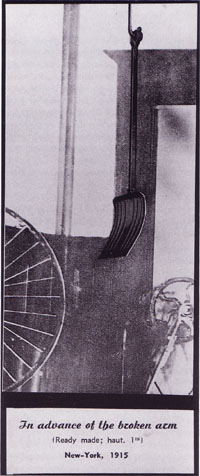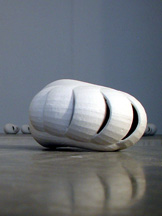Duchampian News & Views
-
Of Being Numerous, No. 12
August 20, 2011 ‘In these explanations it is presumed that an experiencing subject is one occasion of a sensitive reaction to an actual world.’ the rain falls that had not been falling and it is the same world . . . They made small objects Of wood and the bones of fish And of stone. They talked, Families talked, They gathered in council And spoke, carrying objects. They were credulous, Their things shone in the forest. They were patien.. read more... -
Duchamp and the Paradox of Art Spaces, Even
August 19, 2011 In the vein of several recent posts of ours re: the relationship between the readymades and the power of institutions and centrality of art spaces: "post-Duchampian art-beyond-labor reveals itself, in fact, as the triumph of alienated “abstract” labor over non-alienated “creative” work. It is this alienated labor of transporting objects combined with the labor invested in the construction and maintenance of art spaces that ultimately produces artistic value under.. read more... -
Romania and the Avant Garde
August 17, 2011 Romania is not exactly the first country that comes to mind when one thinks of modern art, but exhibitions in Bucharest and Amsterdam are shedding light on this often overlooked center of the avant-garde. The Amsterdam exhibition, “From Dada to Surrealism: Jewish Avant-Garde Artists in Romania, 1910-1938” highlights works of many iconic Jewish Romanian artists. Curated by art historian rabbi Edward Van Voolen and collector Dr. Radu Stern, the exhibition f.. read more... -
Duchamp and the Secret of the Object
August 16, 2011 Our last post included the following quote from the cultural critic Jean Baudrillard: "The obscenity of the commodity stems from the fact that it is abstract, formal, light in opposition to the weight, opacity and substance of the object. The commodity is readable: in opposition to the object, which never completely gives up its secret, the commodity always manifests its visible essence, which is its price. It is the formal place of transcription of all possible objects; t.. read more... -
Secret, Object, Ecstasy
August 15, 2011 "Marx set forth and denounced the obscenity of the commodity, and this obscenity was linked to its equivalence, to the abject principle of free circulation, beyond all use value of the object. The obscenity of the commodity stems from the fact that it is abstract, formal, light in opposition to the weight, opacity and substance of the object. The commodity is readable: in opposition to the object, which never completely gives up its secret, the commodity always manifests it.. read more... -
Even the Exquisite Corpse Festival wonders…
August 14, 2011…what “exquisite corpse taxidermy” means and why they have it. (Exquisite Corpse is a well-known Surrealist game in which one player draws on a piece of paper, folds over their drawing, and passes the paper to the next player, who repeats). The meaning of exquisite corpse music can be extrapolated pretty easily. But taxidermy? Puzzlement all around.
read more... -
Duchamp and the Infrathin
August 12, 2011 "In the wake of modernity we once again find ourselves in the abyss of the infra-thin, a concept that permeates Marcel Duchamp’s entire oeuvre, a shorthand label for his life-long desire to overcome the distance between Signifier and signified, thing and meaning, love and knowledge, inner and outer, up and down, appearance and apparition, mold and molded, of and in. To be precise, the word “infra-thin” was to him “not a noun but an adjective, al.. read more... -
The Looting Imperative
August 12, 2011"Looting is a natural response to the unnatural and inhuman society of commodity abundance. It instantly undermines the commodity as such, and it also exposes what the commodity ultimately implies: the army, the police and the other specialized detachments of the state’s monopoly of armed violence" -Guy Debord
read more... -
Of Rhetoric and Modern Art
August 10, 2011 The onset of modernity, underpinned by the bourgeois revolution, saw art develop into a marketplace commodity sought by many. The critic's pen emerged partly as a substitute for the suspect taste of the buying public. The magazine n+1 recently printed an essay entitled "Against Reviews" excoriating the impersonality and blandness of the whole arrangement (though the author was talking about fiction, and mostly, it seemed, describing bad reviews). But can criticism .. read more...












